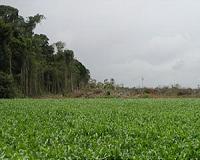 |
New York NY (SPX) May 05, 2010 Millet is the crop that keeps most people alive in Niger. This small nation's population of 15.2 million is largely comprises farmers and pastoralists who depend on rain to sustain the crops and livestock that are their sole sources of income and food. But rains last year were erratic, when they came at all. Millet and other staple crops have failed all over the country. The government of Niger began sounding alarms in January 2010, and the United Nations now warns that food supplies are now dangerously scarce and that 60 percent of the country's population is facing hunger. In 2005, the year of the Asian tsunami, Niger suffered another massive food crisis, and the world was slow to react-or even notice. International aid efforts were not launched early enough to pre-empt a full-blown humanitarian emergency or stop large numbers of children from dying of severe malnutrition. Today, Niger's food crisis threatens to be worse than that of 2005: the government has launched a massive appeal and aid agencies are rallying their resources. Concern Worldwide Country Director for Niger, Niall Tierney says, "Massive crop failure has left people with nothing to harvest to feed their families. Some local markets are still functioning and there is food available-but the poorest have no income to buy it." Sixty-year-old widow Aminatou Acotey is just one of the 7.8 million people with little access to food: "There is no millet to even buy in the village. The closest place to find it is 10 km away-and I can only afford just enough to prepare for my kids, who are crying out of hunger. We have reduced what we eat by half, and we have all lost weight."
History Repeating Itself? Aid agencies, local government, and international partners are better prepared this time around. "We were able to begin tracking the first signs of this crisis in 2009. This time, we are intervening at pre-crisis malnutrition rates, and that means the suffering of many thousands of children may be prevented," said Concern Country Director Niall Tierney. But will enough aid arrive in time? The UN World Food Program is facing a nearly US$100 million shortfall in its funding for Niger and has issued an appeal for $182 million to scale up its operations. "High-level support of Niger's health and nutrition systems is crucial," urges Tierney: "UN agencies and international organizations must provide greater support to Niger's food and humanitarian response pipelines. Without immediate action, there could be up to 378,000 severely malnourished children and 1.2 million moderately malnourished children under the age of five."
Call for Innovative, Immediate Action Concern will also deliver emergency cash to 10,000 families through the innovative use of mobile phone technology and manual cash transfers. The use of mobile phones to transfer money as an emergency response is the first of its kind in Niger and the first ever in Francophone Africa. The influx of cash will help stimulate local markets that still have food available, and allows those at risk to make their own decisions about their most urgent needs. Aminatou Acotey received her first of four monthly installments of cash by text message April 29: "I will spend this money in the market and buy millet...I do not have other means of earning my livelihood." "The people of Niger deserve the most innovative, effective, and rapid interventions that the international community is capable of delivering," says Tierney: "In this day and age, child deaths from hunger are a scandal: we must do everything in our power to halt this crisis."
Share This Article With Planet Earth
Related Links Concern Worldwide Farming Today - Suppliers and Technology
 Large Amounts Of Nitrogen Stored Beneath Selected Agricultural Areas
Large Amounts Of Nitrogen Stored Beneath Selected Agricultural AreasMadison WI (SPX) May 05, 2010 Large amounts of nitrogen are stored in the soils of agricultural areas in Nebraska and Maryland, according to a new study by the U.S. Geological Survey (USGS) and the U.S. Department of Agriculture (USDA). Once in the soil, nitrogen can be converted to nitrate, which can readily move to groundwater. "We expected to find nitrogen stored in organic matter in these soils, but didn't realize ... read more |
|
| The content herein, unless otherwise known to be public domain, are Copyright 1995-2010 - SpaceDaily. AFP and UPI Wire Stories are copyright Agence France-Presse and United Press International. ESA Portal Reports are copyright European Space Agency. All NASA sourced material is public domain. Additional copyrights may apply in whole or part to other bona fide parties. Advertising does not imply endorsement,agreement or approval of any opinions, statements or information provided by SpaceDaily on any Web page published or hosted by SpaceDaily. Privacy Statement |